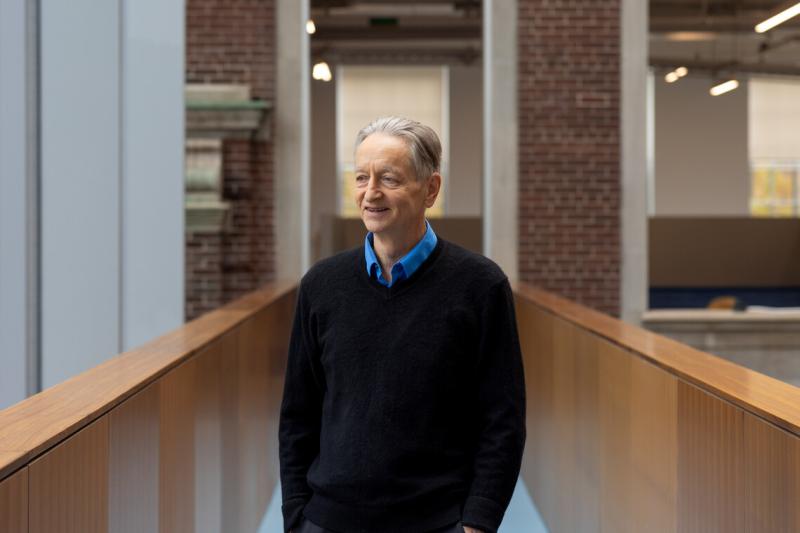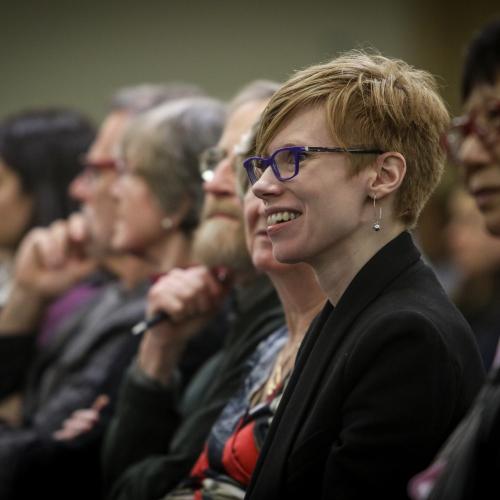Join esteemed U of T alumni and friends for an intriguing conversation with Professor Geoffrey Hinton

Join University Professor Emeritus and Nobel Prize winner, Geoffrey Hinton, for a candid conversation with Nick Frosst (HBSC 2016 WDW A&S), Co-Founder of Cohere, on the opportunities, challenges, and obligations when building a new venture leveraging the power of artificial intelligence. The speaker series will be moderated by CBC Tech Journalist and Broadcaster, Nora Young (HBA 1986 UC A&S).
Artificial intelligence adoption has quickly captured the public imagination and sparked important debates around the world. Governments, business leaders and global citizens are having critical conversations about whether and how AI should be regulated and what guardrails need to be in place to protect society. Advocates on both sides argue about both the enormous potential and risks of this disruptive technology. The rapid emergence of generative AI and large language models (LLMs) has accelerated this debate.
The fireside chat will cover a broad range of topics, including:
-
Canada’s place in the AI revolution
-
Do LLMs understand language in the same way as we do?
-
Reasons for optimism
-
Risks of AI
-
Is digital intelligence better than analog intelligence?
This event is officially part of Toronto Tech Week 2025 – a weeklong citywide collection of events to connect and celebrate the builders, scheduled to run from June 23 – 27.
Speakers
Professor Geoffrey Hinton
 Professor Geoffrey Hinton, 2024 Nobel Laureate in Physics and the “Godfather of AI,” is internationally renowned as a pioneer in the field of deep learning as a mode of artificial intelligence. With John J. Hopfield, he received the Nobel Prize in Physics "for foundational discoveries and inventions that enable machine learning with artificial neural networks,” including his invention of the Boltzmann machine using statistical physics techniques. In 2018, he received the Association for Computing Machinery's A.M. Turing Award, often called the “Nobel Prize in Computing,” alongside Yoshua Bengio and Yann LeCun “for conceptual and engineering breakthroughs that have made deep neural networks a critical component of computing.”
Professor Geoffrey Hinton, 2024 Nobel Laureate in Physics and the “Godfather of AI,” is internationally renowned as a pioneer in the field of deep learning as a mode of artificial intelligence. With John J. Hopfield, he received the Nobel Prize in Physics "for foundational discoveries and inventions that enable machine learning with artificial neural networks,” including his invention of the Boltzmann machine using statistical physics techniques. In 2018, he received the Association for Computing Machinery's A.M. Turing Award, often called the “Nobel Prize in Computing,” alongside Yoshua Bengio and Yann LeCun “for conceptual and engineering breakthroughs that have made deep neural networks a critical component of computing.”
Hinton received his BA in Experimental Psychology from the University of Cambridge in 1970 and his PhD in Artificial Intelligence from the University of Edinburgh in 1978. After completing postdoctoral work at Sussex University and the University of California San Diego, he spent five years as a faculty member in the Computer Science department at Carnegie Mellon University. He then became a fellow of the Canadian Institute for Advanced Research and moved to the Department of Computer Science at the University of Toronto in 1987. He spent three years from 1998 until 2001 setting up the Gatsby Computational Neuroscience Unit at University College London and then returned to the University of Toronto, where he was named a University Professor in 2006 and is now University Professor Emeritus. Since 2017, Hinton has been Chief Scientific Advisor at the Vector Institute in Toronto.
Hinton was one of the researchers who introduced the backpropagation algorithm and the first to use backpropagation for learning word embeddings. His other contributions to neural network research include Boltzmann machines, distributed representations, time-delay neural nets, mixtures of experts, variational learning and deep learning. His research group in Toronto made major breakthroughs in deep learning that revolutionized speech recognition and object classification.
Nick Frosst
 Nick Frosst is a Co-Founder at Cohere, the leading AI platform for enterprise. Cohere’s world-class AI platform is uniquely suited to the needs of business, offering data-secure deployment options in companies’ existing cloud environments, customization, and customer support.
Nick Frosst is a Co-Founder at Cohere, the leading AI platform for enterprise. Cohere’s world-class AI platform is uniquely suited to the needs of business, offering data-secure deployment options in companies’ existing cloud environments, customization, and customer support.
Nick plays a key role in refining user experience while defining a responsibility-focused culture. Before Cohere, Nick collaborated with Geoffrey Hinton, becoming Hinton’s first employee at Google Brain’s Toronto lab. Nick’s research focused on capsule networks, adversarial examples, and explainability.
Based in Toronto, Nick holds a B.S. in Computer Science and Cognitive Science from the University of Toronto. He is also the lead vocalist of the indie pop rock band Good Kid.
Nora Young

Nora is a tech journalist and broadcaster with CBC. She is currently senior technology reporter with the CBC’s visual investigations unit.
Nora created and hosted Spark,an award-winning look at the social impacts of new technology, which aired for 17 seasons. She was the founding host of CBC’s Definitely not the Opera, where she often focused on new media and technology. She has made documentaries and miniseries exploring a range of questions about being human in a rapidly changing world.
As a journalist, author, and speaker, Nora explores how new technology shapes the way we understand ourselves and the world around us. She is the author ofThe Virtual Self, a book about the explosion of data about our behaviours, opinions, and actions.
Her favourite technology is her bicycle.
Have questions about this event?
Contact DUA Events at dua.events@utoronto.ca
This event is part of
Online events
U of T alumni online programming includes free Massive Online Open Courses (MOOCs), the U of T alumni book club, and online lectures and webinars on a wide range of topics from health to computing to Indigenous Studies.
This event is part of
U of T Where You Are
U of T’s popular lecture series comes to where you live and work, in cities around the world. Stay informed, get inspired!







